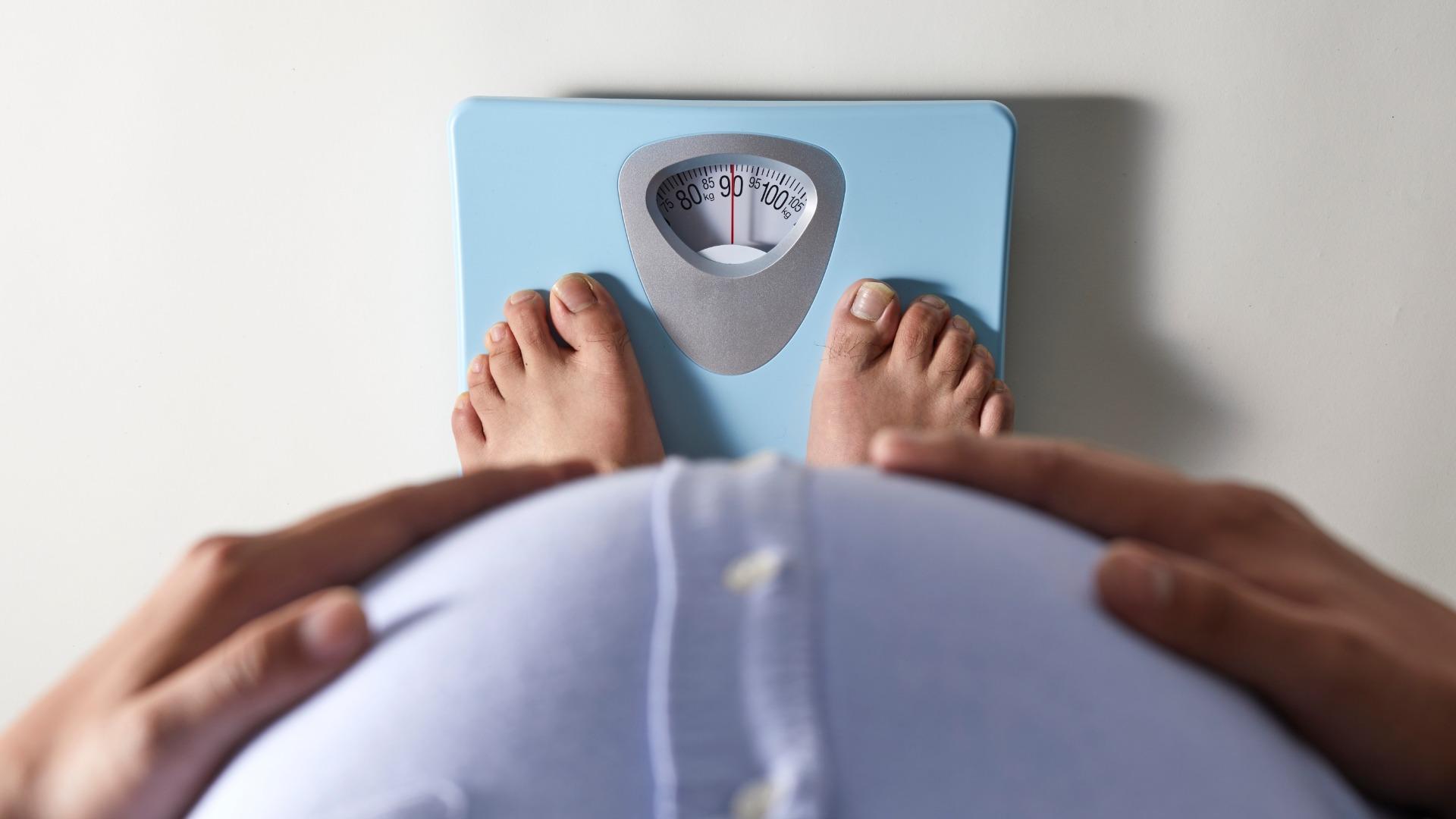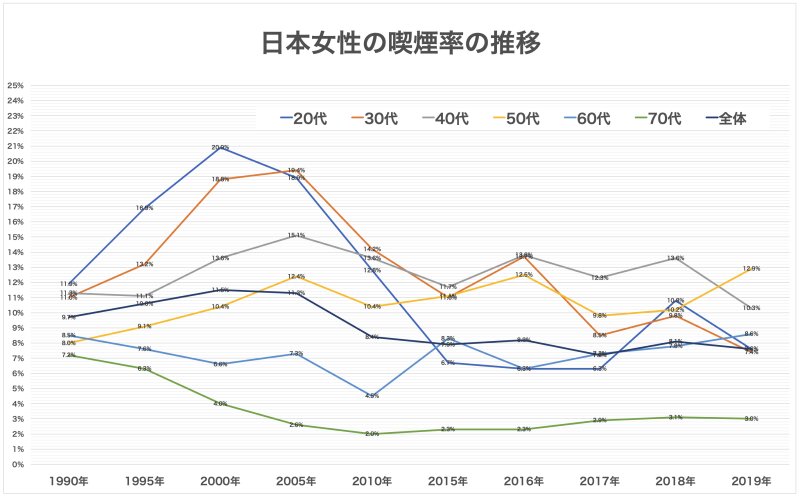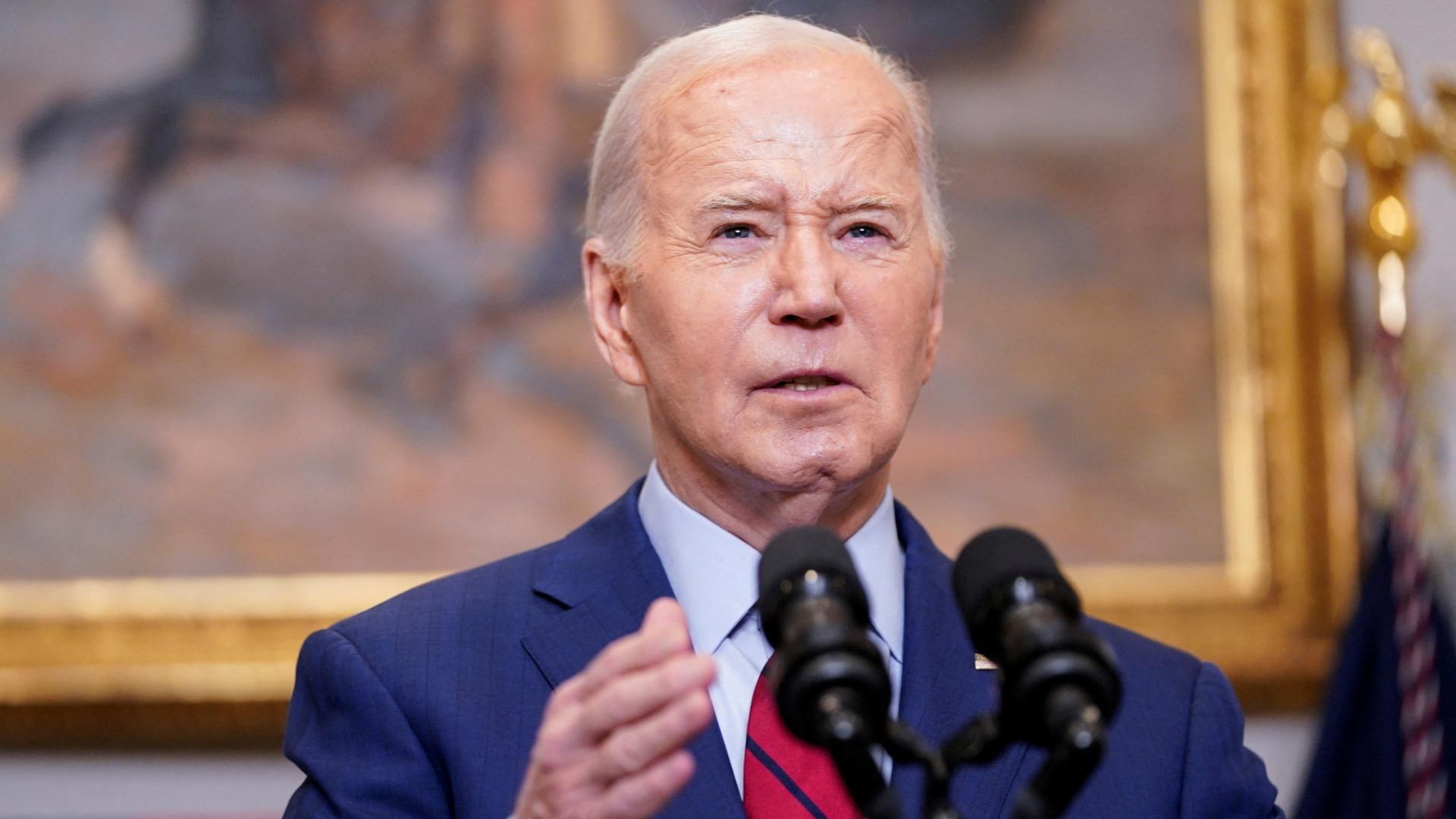禁煙すると「太る」こともあるけど、タバコを吸うよりはずっといい

タバコを吸うと痩せるのは事実だし、禁煙後に体重が増えることも多い。では、喫煙と体重増ではどちらのほうが健康に悪いのだろうか。
太るのを気にする喫煙者
多種多様な病気に対し、もしあなたが喫煙者ならタバコをやめるのは、単一で最大の病気の予防法だが、タバコをやめたら太るんじゃないかという喫煙者も少なくない。特に、痩身志向の強い女性、自分が禁煙できないのをメタボリックシンドローム予防とすり替えるような喫煙者に多くいたりする。
ちょっと古い調査研究だが、日本人の女子学生870人を対象にして喫煙と食習慣の関係を調べた論文によれば、喫煙女性はダイエットしたことが多く、食習慣も乱れがちだったという(※1)。また、思春期の少年少女は太ることを気にしやすく、そのためタバコを吸い始めることもある(※2)。
日本の喫煙率は、この十数年ずっと下がってきたが、女性に限っていうと横ばい状態が続いている。この理由は、女性がおかれた社会経済格差、喫煙に対する誤った情報などがあって、必ずしも痩身志向だけではないが、今でもタバコを吸う理由に痩せたいからという喫煙者がいるのも事実だ。

タバコ産業は、長く女性の痩身志向を利用してきた。例えば、現代的な広告手法を確立したエドワード・バーネイズは、1925年から「お菓子の代わりにタバコを」という広告キャンペーンを展開してラッキー・ストライクの売上を伸ばした(※3)。タバコ産業からの要請を受けたバーネイズは、特にそれまで社会的に喫煙がタブー視されていた女性をターゲットにし、科学的な根拠がないのにもかかわらず、タバコは食欲を抑制し、健康にもいいと訴えた。
禁煙のメリットは体重増のデメリットを上回る
では、喫煙すると痩せられるのだろうか。そして、タバコをやめると体重が増えるのだろうか。
喫煙者には、確かに痩せ気味の傾向がある。これはタバコに含まれるニコチンによる作用だと考えられている。例えば、ニコチンは脳の視床下部のニューロン(Pro-opiomelanocortin、POMC)に作用し、食欲を減退させる(※4)。また、ニコチンがエネルギー代謝を活性化させ、脂肪分解を刺激し、エネルギー消費を増加させることも知られている(※5)。
また、残念ながら、禁煙後に太るのも事実だ(※6)。一般的に、禁煙した人はその年に約4.7kg体重が増えることがわかっている(※7)。
なぜなら、タバコを止めると食べ物を美味しく感じ、口寂しいこともあって間食も増えるし、タバコによって阻害されていた胃腸の調子も良くなり、食欲も出てくるからだ。
その結果、体重が増え、総コレステロール値や空腹時血糖値が悪くなり、糖尿病や高脂血症による動脈硬化のリスクが高くなる。こうした理由で、なかなか禁煙に踏み切れない喫煙者、再びタバコに手を出してしまう禁煙失敗者も少なくない。
もちろん、喫煙は健康に害がある。タバコを吸う人にとって禁煙が、最も効果的な健康法というのはすでに常識だろう。
タバコを吸い続けることで生じる健康リスクと禁煙後の体重増による不利益を比べた場合、前者のほうが重要でタバコを止めるほうがずっと健康利益が大きいという研究は多い(※8)。例えば、大幅な体重増は2型糖尿病の短期的なリスク増加があったものの、それ以外の場合は禁煙するメリットを減らすことはないという大規模な調査研究がある(※9)。
また、体重増加したほうがむしろ心疾患、脳卒中のリスクが低下したという研究報告もある(※10)。これは、禁煙、体重増加、心血管リスク、全死亡率などを調べた9つの研究をメタ分析で比較したもので、禁煙後の体重増に関係なく、禁煙は心血管疾患のリスクを下げ、全死亡率の統計的に有意な低下と関係していたといい、さらに体重が増えた禁煙者のほうがメリットが大きかったという。
日本人は痩せ過ぎ
これはいったいなぜなのだろうか。
タバコをやめると、HDL-コレステロール値(High Density Lipoprotein Cholesterol)、いわゆる「善玉」コレステロール(コレステロールを肝臓へ運ぶことで血中コレステロールを減らす)が増える(※11)。つまり、タバコをやめれば、心血管疾患のリスクを低減させることができることになる(※12)。
そもそも日本人は総じて痩せ過ぎといわれている(※13)。日本人についていえば、肥満よりも痩せ過ぎが健康リスクであり、痩せ過ぎに注意し、タバコを吸っている人は禁煙することで寿命を延ばすことが期待できる(※14)。
タバコをやめた後の体重増には、身体を動かして運動するのが効果的だ(※15)。身体を動かすことでニコチンの離脱症状、つまり禁煙の辛さが和らぐことが知られ、また運動の中ではヨガに高い効果があることが示唆されている(※16)。
以上をまとめると、女性喫煙率が横ばいだが、その理由の一つに禁煙すると太るのではという気持ちがある。喫煙すると痩せ気味になり、禁煙すると太るのは事実だが、体重増のリスクより喫煙のリスクのほうがずっと大きく、太ったとしても禁煙するメリットに影響はないということになる。
※1:保屋野美智子ら、「女子学生の喫煙と食習慣の係わり」、栄養学雑誌、第61巻、第6号、371-381、2003
※2-1:S B. Austin, S L. Gortmaker, "Dieting and smoking initiation in early adolescent girls and boys: a prospective study." American Journal of Public Health, Vol.91(3), 446-450, 2001
※2-2:Jayne A. Fulkerson, Simone A. French, "Cigarette smoking for weight loss or control among adolescents: gender and racial/ethnic differences." Joural of Adolescent Health, Vol.32, Issue4, 306-313, 2003
※3:Amanda Amos, Margaretha Haglund, "From social taboo to “torch of freedom”: the marketing of cigarettes to women" Tobacco Control, Vol.9, Issue1, 2000
※4-1:Hui Chen, et al., "Cigarette Smoke Exposure Reprograms the Hypothalamic Neuropeptide Y Axis to Promote Weight Loss." American Journal of Respiratory and Critical Care Medicine, Vol.173, No.11, 2006
※4-2:Yann S. Mineur, et al., "Nicotine Decreases Food Intake Through Activation of POMC Neurons." Science, Vol.332, Issue6035, 1330-1332, 2011
※5-1:Angela Hofstetter, et al., "Increased 24-Hour Energy Expenditure in Cigarette Smokers." The NEW ENGLAND JOURNAL of MEDICINE, Vol.314, 79-82, 1986
※5-2:K Anderson, P Arner, "Systemic nicotine stimulates human adipose tissue lipolysis through local cholinergic and catecholaminergic receptors." International Journal of Obesity, Vol.25, 1225-1232, 2001
※5-3:J Audrain-McGovern, NL Benewitz, "Cigarette Smoking, Nicotine, and Body Weight." Clinical Pharmacology & Therapeutics, Vol.90(1), 164-168, 2011
※6-1:David F. Willamson, et al., "Smoking Cessation and Severity of Weight Gain in a National Cohort." The NEW ENGLAND JOURNAL of MEDICINE, Vol.324, 739-745, 1991
※6-2:Peggy O'Hara, et al., "Early and Late Weight Gain following Smoking Cessation in the Lung Health Study." American Journal of EPIDEMIOLOGY, Vol.148, No.9, 1998
※6-3:Arnaud Chiolero, et al., "Consequences of smoking for body weight, body fat distribution, and insulin resistance." The American Journal of CLINICAL NUTRITION, Vol.87, Issue4, 801-809, 2008
※7:Henri-Jean Aubin, et al., "Weight gain in smokers after quitting cigarettes: meta-analysis." BMJ, Vol.345, doi: 10.1136/bmj.e4439, 2012
※8-1:Robert Carreras-Torres, et al., "Role of obesity in smoking behaviour: Mendelian randomisation study in UK Biobank." BMJ, Vol.361, 2018
※8-2:Kyuwoong Kim, et al., "Weight gain after smoking cessation does not modify its protective effect on myocardial infarction and stroke: evidence from a cohort study of men." European Heart Journal, Vol.39, Issue17, 1523-1531, 2018
※9:Yong Hu, et al., "Smoking Cessation, Weight Change, Type 2 Diabetes, and Mortality" the New England Journal of Medicine, Vol.379, 623-632, 16, August, 2018
※10:Xiaowen Wang, et al., "Smoking Cessation, Weight Gain, Cardiovascular Risk, and All-Cause Mortality: A Meta-analysis" NICOTINE & TOBACCO RESEARCH, Vol.23, Issue12, 20, April, 2021
※11:B A. Stamford, et al., "Effects of smoking cessation on weight gain, metabolic rate, caloric consumption, and blood lipids." The American Journal of CLINICAL NUTRITION, Vol.43, Issue4, 486-494, 1986
※12:Carole Clair, et al., "Association of Smoking Cessation and Weight Change With Cardiovascular Disease Among Adults With and Without Diabetes." JAMA, Vol.309(10), 1014-1021, 2013
※13:The GBD 2015 Obesity Collaborators, "Health Effects of Overweight and Obesity in 195 Countries over 25 Years." The New England Journal of Medicine, 377, 13-27, 2017
※14-1:Kenneth F. Adams, et al., "Overweight, Obesity, and Mortality in a Large Prospective Cohort of Persons 50 to 71 Years Old." The NEW ENGLAND JOURNAL of MEDICINE, Vol.355, 763-778, 2006
※14-2:Jun Aida, et al., "Social and Behavioural Determinants of the Difference in Survival among Older Adults in Japan and England." Gerontology, DOI: 10.1159/000485797, 2018
※14-3:Atsushi Hozawa, et al., "Association between body mass index and all-cause death in Japanese population: pooled individual participant data analysis of 13 cohort studies." Journal of Epidemiology, doi.org/10.2188/jea.JE20180124, 2018
※15-1:Kinsey Pebley, et al., "A randomized controlled trial to reduce post-cessation weight gain" International Journal of obesity, Vol.47, 471-478, 25, February, 2023
※15-2:Mackenzi Oswald, et al., "Importance of self-weighing to avoid post-cessation weight gain: A secondary analysis of the fit and quit randomized trial" Obesity, Science and Practice, doi.org/10.1002/osp4.668, 8, March, 2023
※16-1:Adrian H. Taylor, et al., "The acute effects of exercise on cigarette cravings, withdrawal symptoms, affect and smoking behaviour: a systematic review." Addiction, Vol.102, Issue4, 534-543, 2007
※16-2:Thaniya Klinsophon, et al., "Effect of exercise type on smoking cessation: a meta-analysis of randomized controlled trials." BMC, Vol.10: 442, 2017
※16-3:Helen Keyworth, et al., "Wheel running during chronic nicotine exposure is protective against mecamylamine-precipitated withdrawal and up-regulates hippocampal α7 nACh receptors in mice." British Journal of Pharmacology, DOI:10.1111/bph.14068, 2017
※16-4:Erika Litvin Bloom, et al., "Quality of life after quitting smoking and initiating aerobic exercise." Psychology, Health & Medicine, Vol.22, Issue9, 2017
※16-5:Ana M. Abrantes, et al., "Acute Effects of Aerobic Exercise on Affect and Smoking Craving in the Weeks Before and After a Cessation Attempt." Nicotine & Tobacco Research, doi.org/10.1093/ntr/ntx104, 2017
※16-6:Beth C. Bock, et al., "Who Enrolls in a Quit Smoking Program with Yoga Therapy?" American Journal of Health Behavior, Vol.41, No.6, 2017
※16-7:Vincezo Monda, et al., "Exercise Modifies the Gut Microbiota with Positive Health Effects." Oxidative Medicine and Cellular Longevity, Vol.2017, doi.org/10.1155/2017/3831972, 2017
※16-8:Kathy Do, et al., "Association between cardiorespiratory fitness and metabolic risk factors in a population with mild to severe obesity." BMC Obesity, Vol.5: 5, 2018










